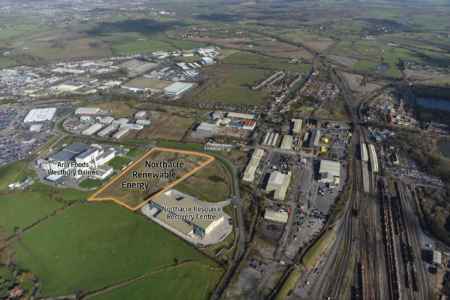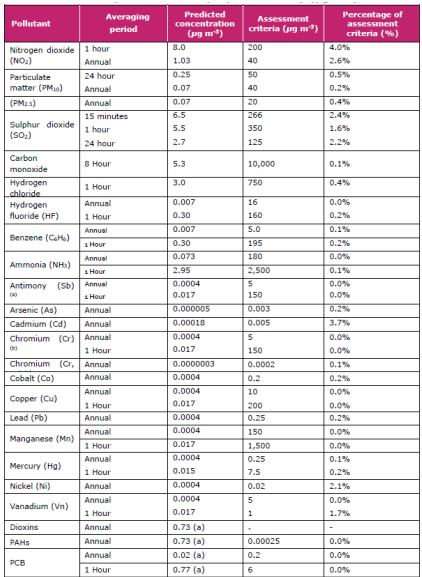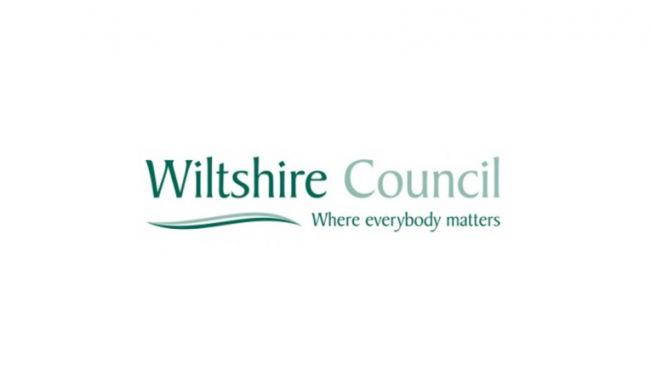Wiltshire council has rejected proposals submitted by Northacre Renewable Energy, a subsidiary of Hills Waste Management, to build an advanced thermal treatment (ATT) facility in Westbury.
Hills has responded by saying it is “in discussion with stakeholders” while it decides on a way forward. Any potential appeal will be referred to the government.

The facility, which will be next to Hills’ resource recovery centre, received planning permission in 2015 but the revisions to this were rejected (picture: Northacre)
The council confirmed that in a meeting on Wednesday (June 18), the strategic planning committee turned down the proposals, which was later confirmed to be on the grounds of “visual impact”. The council members were recommended by officers to approve the plans.
The proposals were for an ATT to be built at the same site as Hills’ existing mechanical biological treatment (MBT) facility which was built in 2013 (see letsrecycle.com story).
Under the rejected proposals, Hills Waste Management said the plant would generate power in the form of electricity and heat to supply local businesses and the National Grid, by using 118,000 tonnes of mixed commercial and industrial waste “that is otherwise not suitable for reprocessing”.
Existing permission
In 2015, Hills was granted permission by Wiltshire Council for an ATT facility on the same site. According to council documents, “this planning permission has not been built out but remains extant”.
However, Northacre went back to the council with a revised application, citing the ‘Contract for Difference’ government subsidy last year and changing technologies as a reason.
“Since planning permission was granted Northacre have been working with providers of the ATT technology as well as investors to obtain a government subsidy for renewable energy which was awarded in September 2017,” Northacre said.
It continued: “The work that had been done with the engineering and procurement contractor [as part of the grant process] looks in detail at construction aspects of project in the scale of the Northacre facility. This is an important pre-development step for any sizeable construction proposal that frequently results in changes and amendments being needed to the build design.”
Increased height
The proposed changes put before Wiltshire council included increasing the height of buildings, from the maximum height of 22 metres to 38 metres and the maximum stack from 60 metres to 70.
Hills applied for increased stack heights to comply with “emerging Environment Agency guidance on best available techniques” and separation of the waste reception building and thermal plant to comply with revised standards for fire control.
However the council, which has not issued a statement on the issue, confirmed that it rejected the proposals, which had received widespread criticism in the public consultation.
‘No objection’
The decision went against the recommendation of the planning officer, who said: ”Having taken into account the environmental information, it is recommended to grant planning permission subject to conditions”.
The conditions included developments beginning within three years of permission being granted, the total tonnage not exceeding 118,000 tonnes a year and restricted times for heavy goods vehicles to be allowed access.
The officer added: “In view of the application site lying within an industrial estate which is designated as a Strategic Scale Waste Site in the Wiltshire & Swindon Waste Site Allocations Local Plan, there can be no objection to the principle of a ‘strategic’ waste recovery facility here.
“Indeed, it is logical to contain such a facility on a site adjacent to another now established waste processing facility which is producing a fuel component for the proposed waste recovery facility – namely the Mechanical Biological Treatment operation.”
In a statement, Hills said: “We are extremely disappointed by the outcome. The facility has existing planning permission and we will discuss this outcome with our stakeholders and decide on a way forward after that.”
Wiltshire
According to the latest waste statistics published by the council, which covers the 2016-17 financial year, just under 60,000 tonnes of waste was treated at the current Hills MBT facility.
Of this, just over 27,000 tonnes of RDF was produced and exported, 798 tonnes recycled, 18,000 landfilled and 13,000 was diverted elsewhere.
The waste statistics also showed that of the approximate 50,000 tonnes of waste sent to energy from waste facilities, 45,000 of this went to the Lakeside facility in Slough, while other timber/chipboard and MDF was exported to Scandinavia and Northern England.
A total of 29,000 tonnes is landfilled excluding MBT residual, the statistics show.
The proposed facility, according to the application, would use gasification technology to generate energy from “41,500 tonnes of solid recovered fuel (SRF) and 118,500 tonnes of mixed commercial and industrial waste that would otherwise be exported to mainland Europe as SRF or landfilled in Wiltshire respectively”.
The post Wiltshire rejects Hills’ ATT revisions appeared first on letsrecycle.com.
Source: letsrecycle.com General




